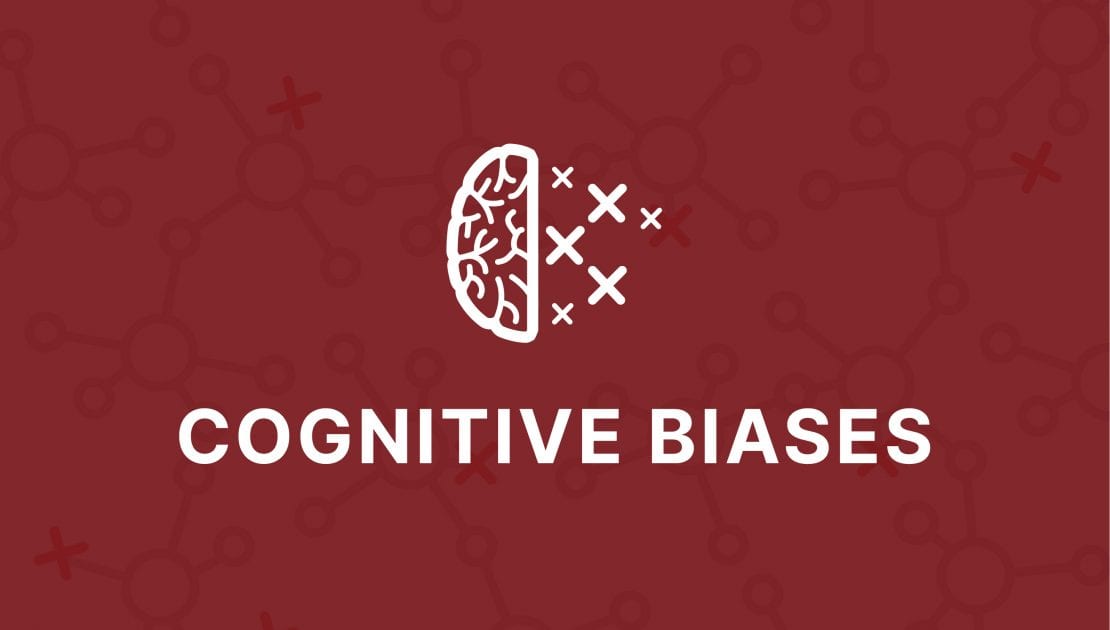
I was excited to see wealthmanagement.com publish a piece I put together recently, Three Cognitive Biases That Could Be Hacking Your Culture, for a number of reasons. Primarily though my excitement stems from the opportunity to open up more productive discussions about the things we do that hold us back in our lives and in our businesses. We can implement every technological solution in the world, but the fact remains that if our heads aren’t in the right place, we are unlikely to live up to our potential, or to help those around us live up to theirs. As Redtail’s Director of Training, I’ll be encouraging Redtail subscribers as well as my co-workers to face head-on the things that may be holding them back – this will be an animating force in the educational campaigns we design and deliver.
With the above in mind, I wanted to share a bit more about the three cognitive biases I discussed in that post over at Wealth Management. I believe we all struggle with these biases to some extent but, by exposing them to the light of day, we can take them out of the shadows and lessen their influence on our decisions and actions.
False Consensus Effect
As a reminder, this particular cognitive bias is the tendency to overestimate how much others agree with your own beliefs, behaviors, attitudes and values. Perhaps the worst thing about the false consensus effect is just how EASY it is to fall prey to this type of thinking.
Researchers suggest that the false consensus effect is driven by three primary factors:
1. Those in our immediate circles (family, friends, etc.) are typically similar to us, with a shared set of beliefs and experiences.
2. Our self-esteem gets a boost from the belief that other people think and act the same way we do. We feel good about ourselves and are motivated to continue in our beliefs and actions because those around us behave the same. It’s the old, “Hey, everybody’s doing it, I can’t be wrong!”
3. Our familiarity with our own beliefs allows us to recognize similar beliefs more easily in those we encounter, at the expense of challenging ourselves with even the possibility of differences from outside our own perspectives.
False consensus, simply put: “Well, this is MY experience, and it’s shared by the people closest around me, therefore it must be common amongst everyone.” It’s easy, it’s safe, and it makes us feel good while doing the minimal amount of mental work. Perspective, or lack thereof, plays a huge part; we collect a very small amount of sample data from a very narrow group of people and then treat it as near-universal fact.
Imagine if, as a financial advisor, you didn’t do any research into a new client’s situation. You just took what you know to have worked previously for an altogether different client and applied it to the way you handle the new client’s portfolio or financial planning. That kind of approach would be unthinkable, for reasons so obvious I don’t even need to expand upon them here.
We all experience and absorb life’s lessons in so many different ways; to fail to understand that, to fail to have that perspective, can lead to narrow-mindedness and, ultimately, ineffectuality.
Self-Serving Bias
This one is the tendency for people to give themselves credit for successes but lay the blame for failures on outside causes. One of the things I try to push myself on, and, frankly, one of the things that I pride myself on, is being real with myself. I try to be very aware of my weaknesses and my strengths and try to shore up those weaknesses where I can.
You see a lot of self-serving bias in sports fans, speaking as an Arizonian heavily invested in the Suns’ fortunes in this year’s NBA Finals. For many sports fans, a win means excellent execution and top-notch play. Meanwhile, a loss is because the referees had it out for them, or because the league wants the other team to win, or because there’s some other great conspiracy theory to explain away the simple fact that your team got outplayed.
Outside of the sports fan arena, where this bias is largely harmless (though it can be annoying to those around you), this may be one of the more insidious cognitive biases; not only does it inflate the part of ourselves that breeds irrational confidence, but it simultaneously masks our ability to recognize areas for potential self-improvement.
If we only take credit for our successes without being real about our failures, how can we possibly hope to improve our own condition, much less the condition of the people we have a responsibility toward, such as our staff or our clients?
The Bandwagon Effect
This one’s kind of a cousin to the False Consensus Effect, in that we do something primarily because other people are doing it, regardless of our own beliefs or experiences.
You might think of this in relation to the stock market – “OH NO, THERE’S A SELL OFF – WE BETTER SELL TOO!” – though with open eyes you’ll likely be able to acknowledge that we all jump aboard one bandwagon or another from time to time. And, unfortunately, making those jumps can be to our own detriment or to the detriment of those around us.
Regardless of the cognitive bias under consideration, they each require EFFORT to combat. It can be a real struggle not to fall prey to these systematic errors in thinking and subsequently use them as our basis for decision-making. We must be conscious, aware, and willing to sometimes fight against our own thoughts and feelings to avoid the stumbling blocks cognitive biases often strew in our paths.
It gets easier over time, sure, as with anything we put the work into. Repetition and practice will make it easier, will make you sharper, just like working out will make you stronger. But, we have to be willing to put in the work.
Final thought: the company name “Redtail Technology” is synonymous with dedicated client service; that is among the reasons our customers choose us. Another thing we’re known for, and a piece of that fantastic client service, is our training programs. Part of what sets apart our training sessions is that we make a conscious effort to account for people’s biases (and how these may impact their learning) as much as we can. My hope is that some of the above may have hit home for you in terms of how you might address cognitive biases that could be affecting your training efforts, your business relationships, and your company culture as well.


